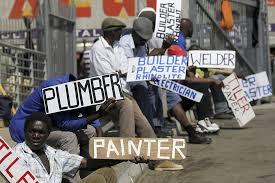
ZIMBABWE is at economic crossroads. The haemorrhaging of jobs in the retail and mining sectors is not just a sectoral problem — it is a national emergency that speaks volumes about the structural frailties of our economy and the urgent need for bold leadership to tackle this growing cancer.
Thousands of workers are being thrown onto the streets, not as a result of market forces alone, but because of predictable and preventable policy failures.
Power shortages, policy inconsistencies, inflated interest rates, and lack of investor confidence are crippling formal business.
Meanwhile, the informal economy balloons, not as a sign of resilience, but as a refuge of last resort for a desperate workforce.
The collapse of the retail sector, one of Zimbabwe’s biggest formal employers, has a cascading effect across supply chains, affecting agriculture, manufacturing, logistics, and wholesale markets.
At the same time, our mining sector, which has long been a pillar of foreign currency earnings, is retreating under pressure from falling commodity prices, global energy transitions, and local mismanagement. That over 2 000 jobs have already been lost in the lithium subsector alone is deeply alarming.
What is even more concerning is the lack of an urgent, coordinated national response. Industry leaders, labour unions, and workers are sounding the alarm, but those with the power to act appear either indifferent or paralysed.
Calls for concessional loans, bailout funds, and meaningful social dialogue have yet to translate into policy shifts.
- Mavhunga puts DeMbare into Chibuku quarterfinals
- Bulls to charge into Zimbabwe gold stocks
- Ndiraya concerned as goals dry up
- Letters: How solar power is transforming African farms
Keep Reading
The time for platitudes and workshops is over. Zimbabwe needs a bold, multi-pronged plan to rescue its formal economy.
First, the government must urgently implement stimulus packages targeted at sectors shedding the most jobs.
Second, it must fast-track regulatory reforms to attract and retain investment, not just on paper, but in reality.
Third, we must decisively implement beneficiation policies in mining to create local value chains and jobs. Exporting raw minerals while importing poverty is no longer an option.
There is also a need to aggressively address the informalisation of the economy.
While small-scale entrepreneurs are vital, their growth should not be predicated on the collapse of the formal sector. We must level the playing field, making it easier for formal businesses to thrive, compete, and hire.
This is not just about economics: it is about dignity, livelihoods, and social stability. If Zimbabwe continues to bleed jobs at this rate, we risk entrenching poverty, worsening inequality, and inviting political and social unrest.
Zimbabwe’s policymakers must rise above inertia. The warning lights are flashing. What is needed now is action — decisive, transparent, and inclusive.
Our economy, and the millions who depend on it, cannot afford another lost decade. Certainly, for the sake of our children and future generations, we must act now.






